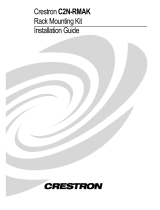
CAT5 Audio Distribution Processor Crestron CNX-BIPAD8
2 • CAT5 Audio Distribution Processor: CNX-BIPAD8 Operations Guide – DOC. 8160B
Up to 24 Stereo Sources x Up to 32 Rooms
The CNX-BIPAD8 is a high performance 24 x 8 stereo audio switcher and
preamplifier, providing distribution of 16 stereo audio sources and eight room inputs
to any of eight room outputs. Up to four CNX-BIPAD8s may be combined to handle
as many as 32 rooms*. Every room output includes independent control over
volume, bass, treble, balance, loudness, and mute. Mono summing is also built in to
facilitate distribution to non-stereo zones.
*Room outputs are expandable by cascading the inputs of multiple units using standard RCA interconnect
cables. Crestron recommends cascading no more than four units. The actual number of possible units in a
system is virtually unlimited, although additional equipment may be necessary to maintain signal
integrity. Contact Crestron for additional assistance.
Crestron Home
®
CAT5 Balanced Audio
The CNX-BIPAD8 is designed to provide maximum flexibility for audio distribution
through the use of Crestron's bidirectional CAT5 balanced technology. The
CNX-BIPAD8 supports a versatile combination of balanced line level and
speaker-level audio, featuring both balanced and unbalanced connections on each
room output. The RCA-type unbalanced connections may be used to directly drive a
multi-channel amplifier, while the RJ-45 CAT5 connections enable distribution of
line level signals to remote room locations up to 1000 feet (305 meters) away.
Room Solution Boxes
At each remote room location, one of Crestron’s "Room Solution Boxes" is
connected to the television or local amplifier to receive the CAT5 signal and serve as
a local preamp and switcher. Audio-capable models include the CNXRMCLV,
C2N-DAP8, and C2N-DAP8RC. These models also support a "return" audio signal
over the same CAT5E cable allowing the signal from a local audio source to be
routed to the head-end for redistribution to other rooms. A single CNX-BIPAD8 can
receive and redistribute return signals from up to eight rooms without additional
equipment. For systems utilizing multiple CNX-BIPAD8s, one CNX-PBAR4
balanced audio receiver must be added for every four room returns.
Advanced Features
Additional features make the CNX-BIPAD8 a truly refined audio component.
Programmable input gain compensation assures a consistent level when switching
between input sources. Scaling factor settings allow minimum and maximum levels
to be defined for each room output. Protective relays on each output prevent
"thumps" during power-up and provide total attenuation when any room is turned
off.
A Complete System Solution
Together with any 2-Series control system, Crestron's audio distribution processors
provide an extensively customizable audio control solution. For the ultimate in audio
performance, just add a CNAMPX-series multi-room amplifier to form a total,
intelligent audio head-end. Crestron keypads and touchpanels complete the system,
putting essential control access within arm's reach throughout the home, office,
restaurant, etc.
SystemBuilder
™
Programming
Crestron's SystemBuilder software can make audio distribution programming a quick
and simple task, providing easy drag-and-drop system configuration with extensive
support for interfacing to hundreds of AV devices through Crestron's vast database
of third-party codes and drivers. Hi-tech or bare necessity, for all tastes and technical





















